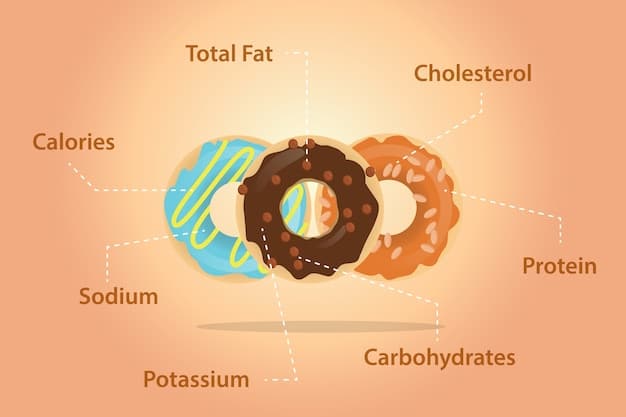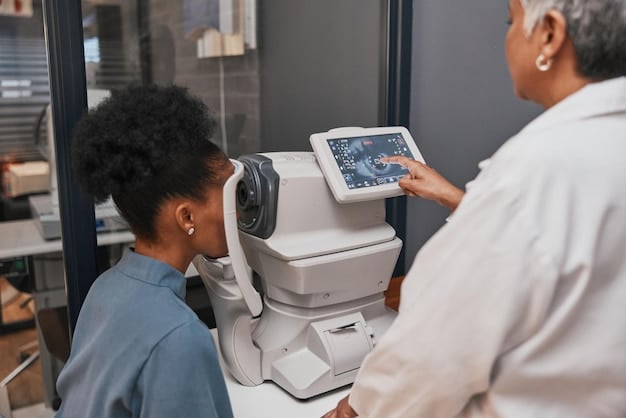Protect Your Vision: Latest Research on Preventing AMD

Protect Your Vision: The Latest Research on Preventing Age-Related Macular Degeneration reveals promising advancements in understanding and mitigating this prevalent eye condition, emphasizing early detection and lifestyle modifications.
Worried about your eyesight as you age? You’re not alone. Age-related macular degeneration (AMD) is a leading cause of vision loss for older adults. But there’s hope! Protect Your Vision: The Latest Research on Preventing Age-Related Macular Degeneration offers valuable insights and practical steps you can take to safeguard your sight.
Understanding Age-Related Macular Degeneration
Age-related macular degeneration (AMD) is a common eye condition that affects the macula, the central part of the retina responsible for sharp, central vision. Understanding AMD is essential to taking proactive measures to protect vision.
AMD primarily impacts individuals over the age of 50, and its prevalence increases with age. Early detection and preventive strategies can play a crucial role in slowing its progression and preserving vision.
Types of AMD
AMD is broadly classified into two main types:
- Dry AMD: This is the more common form, characterized by the presence of drusen, small yellow deposits under the retina. Dry AMD progresses slowly and may not always lead to severe vision loss.
- Wet AMD: This form is less common but more aggressive. Wet AMD involves the growth of abnormal blood vessels under the retina, which can leak fluid and blood, causing rapid vision loss.
Knowing the type of AMD is important for determining the appropriate course of treatment. Regular eye exams are key to detecting any changes.

Ultimately, a proper understanding of AMD, coupled with regular eye examinations, empowers individuals to take proactive steps to Protect Your Vision: The Latest Research on Preventing Age-Related Macular Degeneration. Early intervention and preventive measures can substantially impact the long-term preservation of sight.
The Role of Nutrition in Preventing AMD
What you eat can significantly impact your eye health, particularly in preventing or slowing down AMD. Specific nutrients and dietary patterns have been linked to a lower risk of developing this condition.
Consuming a diet rich in antioxidants, vitamins, and minerals can help protect the delicate structures of the eye from oxidative stress and damage.
Key Nutrients for Eye Health
Several nutrients are particularly beneficial for eye health:
- Lutein and Zeaxanthin: These carotenoids are found in high concentrations in the macula and help protect it from light damage. Good sources include leafy green vegetables like spinach and kale.
- Vitamin C and Vitamin E: These antioxidants help protect against free radical damage. Citrus fruits, berries, nuts, and seeds are excellent sources.
- Zinc: This mineral plays a crucial role in maintaining the health of the retina. Good sources include oysters, beef, and pumpkin seeds.
Consider incorporating a variety of colorful fruits and vegetables into your daily diet to ensure you’re getting a wide range of essential nutrients. Addressing nutritional needs is essential to Protect Your Vision: The Latest Research on Preventing Age-Related Macular Degeneration.
By focusing on a balanced diet rich in eye-healthy nutrients, individuals can proactively support their vision and reduce the risk of AMD. Dietary changes, combined with other preventive measures, can contribute significantly to long-term eye health.
Lifestyle Factors That Can Help Prevent AMD
Beyond nutrition, several lifestyle factors can play a significant role in reducing your risk of developing AMD. These factors often involve making conscious choices that promote overall health and well-being.
Adopting a healthy lifestyle can help protect your eyes from the harmful effects of aging and reduce the risk of AMD progression.
Smoking and AMD
Smoking is one of the most significant modifiable risk factors for AMD. Studies have shown that smokers are more likely to develop AMD compared to non-smokers.
Quitting smoking can significantly reduce your risk of developing AMD and slow its progression if you already have the condition.
Other Important Lifestyle Choices
Additional lifestyle choices that can positively impact your eye health include:
- Regular Exercise: Physical activity improves circulation and can help protect against AMD.
- Maintaining a Healthy Weight: Obesity is linked to an increased risk of AMD.
- Protecting Your Eyes from UV Light: Wear sunglasses that block 100% of UVA and UVB rays when outdoors.
Making these lifestyle changes may contribute significantly to Protect Your Vision: The Latest Research on Preventing Age-Related Macular Degeneration. A proactive approach to health can have far-reaching benefits for your vision.
By incorporating these lifestyle factors into your daily routine, you can take control of your eye health and reduce your risk of AMD. A combination of healthy habits and regular eye exams is essential for preserving your vision.
Early Detection and Regular Eye Exams
Early detection is crucial in managing AMD effectively. Regular eye exams can help identify the condition in its early stages, allowing for timely intervention and treatment.
Comprehensive eye exams can detect even subtle changes in the macula, providing valuable insights into your eye health.

What to Expect During an Eye Exam
During a comprehensive eye exam, your eye doctor will perform several tests to assess your vision and examine the health of your eyes, including:
- Visual Acuity Test: This test measures your ability to see clearly at various distances.
- Dilated Eye Exam: Your eyes will be dilated with eye drops, allowing the doctor to examine the retina and macula in detail.
- Optical Coherence Tomography (OCT): This imaging technique provides detailed cross-sectional images of the retina.
Scheduling regular eye exams, even if you don’t have any noticeable vision problems, is critical for maintaining good eye health. Using proactive means is key to enabling people to Protect Your Vision: The Latest Research on Preventing Age-Related Macular Degeneration.
Regular eye exams play a vital role in the early detection and management of AMD. By staying proactive and scheduling routine check-ups, you can protect your vision and ensure timely treatment if needed.
Advancements in AMD Treatment and Research
Ongoing research is continually improving our understanding of AMD and leading to new and more effective treatments. Staying informed about these advancements can provide hope and options for those affected by this condition.
Medical experts are constantly working to develop novel therapies and strategies to prevent and treat AMD.
Current Treatment Options
While there is no cure for AMD, several treatments can help slow its progression and manage its symptoms:
- Anti-VEGF Injections: These medications are injected into the eye to block the growth of abnormal blood vessels in wet AMD.
- Laser Therapy: Laser treatments can be used to seal leaking blood vessels in wet AMD.
- Nutritional Supplements: Certain supplements, such as those containing lutein, zeaxanthin, vitamin C, vitamin E, and zinc, may help slow the progression of dry AMD.
The future of AMD treatment is promising, with ongoing research exploring new and innovative approaches, which will enable people to Protect Your Vision: The Latest Research on Preventing Age-Related Macular Degeneration.
Continued advancements in AMD treatment and research offer hope for improved outcomes and vision preservation. Staying informed and working closely with your eye care professional can help you make the best decisions for your eye health.
| Key Point | Brief Description |
|---|---|
| 🔬 Early Detection | Regular eye exams are crucial for early AMD detection. |
| 🍎 Nutrition | Diets rich in lutein, zeaxanthin, and vitamins help. |
| 🚭 Lifestyle | Quit smoking, exercise, and protect eyes from UV. |
| 💉 Treatment Advances | Anti-VEGF injections and laser therapy improve outcomes. |
Frequently Asked Questions About AMD Prevention
While diet alone cannot guarantee prevention, a nutrient-rich diet including foods like leafy greens and fish can significantly reduce the risk of developing AMD.
Adults over 50 should have comprehensive eye exams every 1-2 years, or as recommended by their eye doctor, to monitor for signs of AMD.
Early symptoms include blurred vision, difficulty seeing in low light, and a decrease in the intensity of colors. Regular checkups can help detect these signs early.
Currently, there is no cure for AMD, but treatments are available to slow its progression and manage symptoms. These treatments aim to preserve existing vision.
Smoking significantly increases the risk of developing AMD and can accelerate its progression. Quitting smoking is crucial for protecting your vision and overall health.
Conclusion
Taking proactive steps to Protect Your Vision: The Latest Research on Preventing Age-Related Macular Degeneration is crucial for maintaining good eye health as you age. By adopting a healthy lifestyle, prioritizing early detection, and staying informed about the latest advancements in treatment, you can significantly reduce your risk of developing AMD and preserve your vision for years to come.





